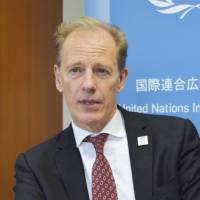
Kathmandu (Pahichan) June 17 – A senior U.N. Human Rights official said the Japanese business sector should play a greater role in eliminating discrimination against sexual minorities.
“I think there is less progress both in laws and in public attitudes in Japan than the other six countries of the G7,” Andrew Gilmour, assistant secretary-general of the U.N. Human Rights Office, said in a recent interview in Tokyo. “We are hoping that we can encourage better improvement, better acceptance.”
One in 13 people in Japan is estimated to be a member of the lesbian, gay, bisexual and transgender community, according to a survey conducted in 2015 by the Japanese advertising giant Dentsu Inc.
Japan has seen gradually growing acceptance of sexual minorities with more municipal governments launching certificate systems to recognize partnerships of LGBT couples. But marriage remains limited to a union of a man and a woman.
Another survey of 3,693 listed companies by Mitsubishi UFJ Research and Consulting found only 3.6 percent of 168 respondents were actively hiring and promoting LGBT people.
“The most powerful element of a society is the private sector. That’s why we are aiming to talk to them,” Gilmour said.
He visited Japan earlier this month to promote LGBT equality in workplaces, as the United Nations issued last September business standards on treatment of LGBT employees, which 137 companies around the world, including Japan, have supported.
Gilmour said the 2020 Tokyo Olympics and Paralympics offers a good opportunity for Japan to demonstrate its commitment to the LGBT community.
“2020 is really a catalyst,” he said, describing the games as a “showcase for human rights.”
“I think that using 2020 and the short time we have between 2018 and 2020, I think there will be a rapid progress and we certainly encourage that,” he said.
The revealing of an LGBT sexual orientation by influential people like high-profile businesswoman Kazuyo Katsuma, and by an increasing number of young people, heralds the start of wider acceptance of sexual minorities, Gilmour said.
“Some cases like that normally have an accelerating effect,” he said.
Katsuma, a 49-year-old mother of three who was on the Wall Street Journal’s list of “The 50 Women to Watch” in 2005 for gaining “legions of fans among Japanese working mothers,” disclosed last month she is in a same-sex relationship.
Gilmour shrugged off the idea that human rights of LGBT people are a “western phenomenon,” saying that is mostly presented by some countries hostile to LGBT rights. The concept is “universal,” he said.
Copy : www.japantimes.co.jp
Copyright © All right reserved to pahichan.com Site By: Sobij.